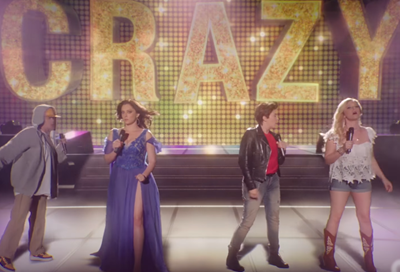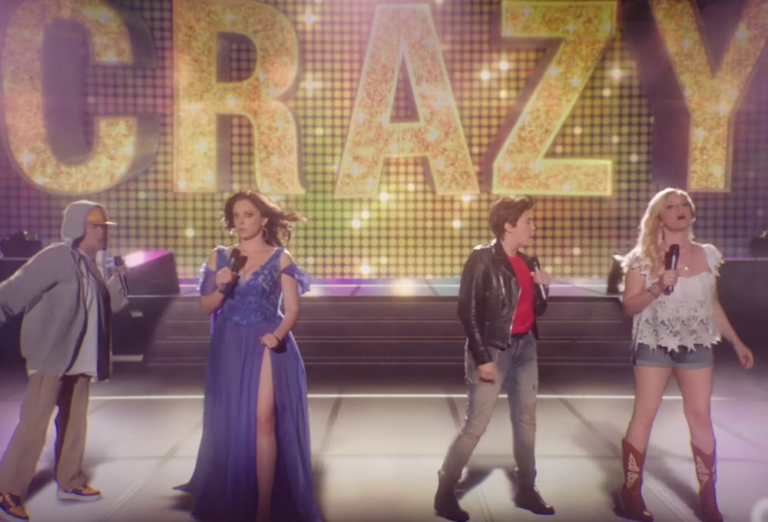
Want to hear something really crazy? I’m about to give you a tip that might change the way you experience virtually every casual conversation: listen to the word “crazy.” Most likely, you and the people you talk to use it all the time without even realizing it.
Here’s another tip: There are good reasons why you might want to stop using this word. In fact, I first noticed that the term “crazy” was everywhere when a friend told me she was trying not to use it anymore. “It’s crazy,” she said, it perpetuates the stigma around mental health. After that, I started hearing this word constantly, in my own speech and that of others. It’s even in the title of one of my favorite TV shows, the CW Network’s cult musical theater-inspired drama, “Crazy Ex-Girlfriend.”
Why is the word “crazy” such a bad thing? Shouldn’t we all be free to use whatever words we want? I sat down with an expert, Brenda Curtis, Ph.D., MsPH, assistant professor of psychology in psychiatry at Penn Medicine, to discuss language, stigma around mental health and “Crazy Ex-Girlfriend” — a show Curtis admits she couldn’t bring herself to watch because of the name, and specifically this word, turned her off. With the help of musical accompaniment taken from the TV show’s theme music, as well as Curtis’ expertise on the topics of language, stigma and mental health, here’s a brief overview of the response to the question of why you should reconsider calling things “crazy.” »
“Crazy” might be a sexist term.
Since its premiere in 2015, “Crazy Ex-Girlfriend” has played with the use of the word “crazy” in its theme songs, which vary each year. The theme of the first season introduces the premise of the series: Rebecca Bunch, a high-ranking lawyer in New York, abandons her life and starts over in California in an irrational and obsessive attempt to reunite with her first boyfriend. The song also includes a playful refrain of “She’s a crazy ex-girlfriend,” lyrics that Rebecca takes issue with, saying, “It’s a sexist term!” »
Curtis, who has researched language and stigma particularly as it relates to addiction, thinks the sexism allegation could be true. Although she hasn’t researched sexist uses of the word “crazy,” she points out that there are sexist stereotypes of women as irrational, hysterical, and out of touch with reality—all meanings associated with the word “crazy.” mad “. .”
Calling things “crazy” perpetuates stigma, which can make it harder for people to seek treatment.
The fact that the word “crazy” is based on stereotypes, and more specifically on a stigmatized stereotype, is the crux of the problem with the use of this word.
Stigma, Curtis explains, is a situation that arises when two key ingredients are present: a negative stereotype about a group of people or condition, and actions people take to distance themselves from being associated with that group or condition. condition. Stigma is a type of social distancing that occurs when we perceive a group as “other” and “not like us.”
“One of the common stereotypes about mental health and substance use disorders is the idea of moral failure,” says Curtis. “A lot of people will think, ‘Oh, they’re just sad, get over it,’ or ‘oh, if you don’t want to do drugs, stop, no one forced you to.'” She also notes that ideas about mental illness perpetuated by words like “crazy” include the idea that people with mental illness are out of touch with reality, irrational, or incapable of making decisions. These stereotypes and the sense of blame they place on a person with mental illness tend to place people in a category of “other” that few people want to claim as their identity.
It’s time for our next musical interlude: In the second season theme song of “Crazy Ex-Girlfriend,” Rebecca’s adoring chorus asks the viewer not to call her “crazy,” even though her behavior in the series has become exaggerated and erratic, notably stalking. She doesn’t want to be associated with the word “crazy”, perhaps because of the stereotypes attached to it. Instead, she clings to a cover story (“just a girl in love”) that isn’t subject to social stigma.
https://www.youtube.com/watch?v=zJe2Fkf5i5g
“When you have a person who is going through a difficult time and needs to talk to someone and needs treatment, they are less likely to seek help from their doctor or someone else if they doesn’t want this person to see her in a difficult environment. a different light,” says Curtis. In this way, stigmatizing mental health issues – by maintaining stereotypes and creating social distance because of those stereotypes – makes it more difficult for people to get help. “When stereotypes affect treatment, whether it’s at the start of treatment or when engaging in treatment, when they isolate people, that’s a problem,” she says.
“Crazy” is a catch-all word that doesn’t mean just one thing.
Another problem with the word “crazy”? It doesn’t just mean one specific thing. The theme song for the third season of “Crazy Ex-Girlfriend” personifies this concept to the point of being almost parodic, as Rebecca describes four different characters who are all different versions of the concept “crazy”. (During this season, Rebecca comes to terms with having a mental illness, which she eventually receives a diagnosis and undergoes treatment.)
https://www.youtube.com/watch?v=VpuJ_SJEQJU
Like me, Curtis began to notice how much we use the word “crazy” in casual conversations, in all sorts of different contexts, for all sorts of different reasons. She equates this to how her parents taught her not to use swear words in casual conversation; When you use a swear word as an adjective or noun in a sentence, it’s not only rude, it’s also a lazy way to avoid thinking about the more precise word you actually mean.
People use the word “crazy” to mean silly, strange, or extravagant; they use the word as a modifier like “extremely” or “intensely”; they use it to mean irrational or inexplicable; and sometimes they use it to describe mental illness.
“Why can’t we use a different word? » asks Curtis. “When a person becomes aware of the connotations of the word ‘crazy,’ can we just start using a different word? You use it as a catch-all. We should replace it with more words, not another catch-all.
Lesson learned: use the words you mean and use person-centered language.
There are three keys to using language about mental illness, Curtis notes: Use the correct words to describe something (the name of a diagnostic category if it’s a mental illness, or a general descriptive word as “extravagant” otherwise, not just “crazy”). for everything); recognize when stereotypes exist and demystify them; and use language that recognizes that a person is distinct from their illness.
In his own research on language and addiction, Curtis has found that people have negative associations with words such as “addict” and “addict.” But, she said, that doesn’t mean people should talk more about substance abuse or addiction, or about people struggling with these conditions. “Use the word you want to say and use person-centered language,” she says. It means “you don’t want to define someone by their disorder.” So you are not describing someone as an “intravenous drug user”, but rather as “a person who injects drugs”. Defining a behavior means that the person can change that behavior and does not necessarily have to bind themselves to the negative stereotypes attached to that behavior. an identity label.
Speaking of person first, the theme song for the upcoming final season of “Crazy Ex-Girlfriend,” in which the protagonist is in treatment for her mental health disorder, is all about person. “Meet Rebecca” is the chorus, and the word “crazy” is not pronounced at all.
Can you also challenge yourself to stop using this word?
